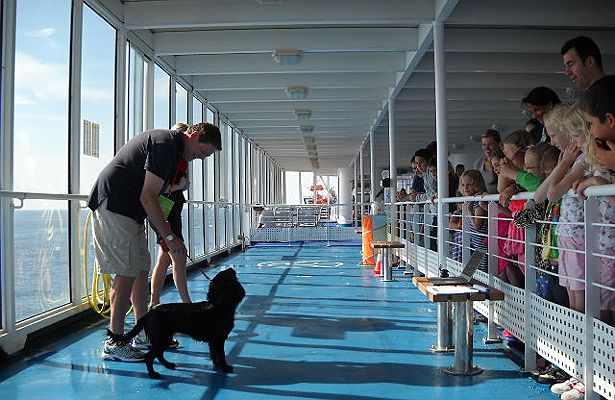Only trained dogs should be allowed as service animals on passenger vessels, so operators and customers aren’t confused by federal agencies’ different rules for complying with the Americans with Disabilities Act (ADA), the Passenger Vessel Association told regulators.
Early in 2011, two agencies’ rules that require operators to allow qualified service animals on board that do such jobs as help someone walk or retrieve items or recognize seizure symptoms went into effect. But the Department of Justice limits service animals to dogs — and occasionally miniature horses, while the Department of Transportation includes dogs or other animals that meet specific training requirements, PVA said in an Aug. 29 letter to the Office of Information and Regulatory Affairs (OIRA). The letter is in response to a Trump administration push to reduce or modify regulations, and it supplements comments PVA made earlier.
The two agencies regulate separate aspects of the passenger vessel market. The DOT oversees ferries and overnight cruise vessels. The DOJ covers public accommodations, which would include dinner, sightseeing and whale watching cruises. In practice that means two vessels can be docked next to one another and have to meet different service animal requirements, PVA said. What’s more, one vessel can serve both purposes at separate times on the same day, a “confusing and untenable” situation.
Justice’s rule is "clear-cut, based on better reasoning, and developed after extensive public comment," the PVA asserts.
The DOJ noted that when the ADA was first adopted in the early ‘90s it did not define acceptable animal species. “At that time, few anticipated the variety of animals that would be promoted as service animals in the years to come, which ranged from pigs and miniature horses to snakes, iguanas, and parrots,” the agency said in the Federal Register.
The Justice Department received many comments recommending species limits, with several people arguing that a limit “would help stop erosion of the public’s trust,” which has led to reduced access for many who use “trained service animals that adhere to high behavioral standards.” The animal provision of the ADA has been a persistent challenge for vessel operators. The law is clear about what constitutes a service animal, but that hasn’t stopped some people from trying to stretch the definition with emotional support animals that don’t qualify.





